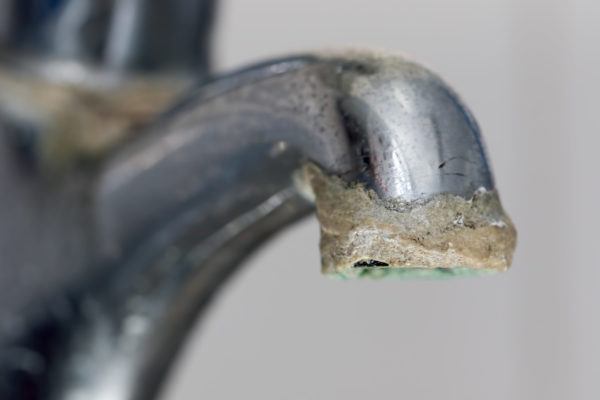Keep Limescale Out of Your Home With These Great Tips
As a homeowner, it’s your job to protect your home from unwanted hazards. One commonly overlooked hazard is limescale buildup. You’ll find this on your faucets, showerheads, and other water fixtures throughout your home. Taking the time to enact some measures to reduce your risk of limescale buildup can help to keep your home safe and your family comfortable.
What Is Limescale Buildup?
If you’ve ever noticed a white, chalk-like substance on your faucet or showerheads, then you’ve seen limescale. Limescale is simply a deposit of minerals that are left behind by your water. The most common mineral left behind is calcium carbonate. Depending on where you live, your water supply may be deemed as “hard water.” This simply means that the water that comes into your home has a higher mineral content than normal.
Homes that have hard water are more likely to develop limescale buildup on their water fixtures as well as inside of their piping. Paying close attention to the fixtures in your home and taking active measures against limescale buildup can help to reduce your risk of experiencing it.
Get a Water Softener
Probably the easiest way to combat limescale buildup in your home is to get a water softener. This is a water filtration device that actively works to remove high concentrations of magnesium and calcium from the water in your home. Most water softeners are installed close to where the main water valve comes into your home so that they can treat the water before it’s delivered to any of your sinks, showers, and other water fixtures.
Most water softeners work by utilizing ion exchange that requires spherical resin beads. Hard water minerals of magnesium and calcium have a negative ion charge. Your water softener is filled with resin beads that have a sodium ion inside of them that is positively charged. As the water moves through the water softener, the negatively charged minerals will immediately attract the positive charge of the resin beads. As the calcium and magnesium minerals get trapped inside the resin bead, the sodium ion inside is released into your water. This whole process helps to remove those hard water minerals to soften the water that ends up moving throughout the rest of the piping in your home.
Water Filters
If you don’t want to invest the money in a water softener or if you or someone in your home is on a low sodium diet, another great option to combat hard water is to use water filters. These filters are specifically designed to screw onto the faucets throughout your home. Inside each filter housing is a cartridge that works to remove calcium and magnesium from the water that flows through it. It’s crucial to know that you will need to change out the cartridges on all your filters on a consistent basis to keep limescale to a minimum.
Magnetic Water Conditioner and Descaler
Another great water filtration option for those who are on a low sodium diet is a magnetic water conditioner and descaler. These systems tend to be less expensive than sodium-based water softeners, and they have long operating lives of up to 40 years. Magnetic water conditioners work by utilizing electromagnetic coils. These coils work to polarize calcium and magnesium from the water coming into your home. Once polarized, these hard water minerals are no longer able to attach to your water fixtures.
Clean Your Hot Water Tank Regularly
One area in your home that is highly susceptible to limescale buildup is your hot water tank. Since water is constantly sitting in your hot water tank, it allows the calcium and magnesium minerals to float easily to the bottom and create a layer of limescale. Over time, this can cause excessive corrosion on the inside of your hot water tank and result in its premature replacement.
It’s a good idea to flush out your hot water tank on a consistent basis. This will allow you to remove any excess sediment that is inside of your hot water tank and help to prevent corrosion of the tank itself. If you live in an area that gets a lot of hard water, you should consider flushing your hot water tank at least four times a year.
Vinegar Baths for Wet Appliances
When you’re constantly running hard water through your wet appliances, they can be prone to receiving high levels of limescale buildup. Over time, this buildup can increase the efficiency of the appliance and cause you to have to replace it more often. One of the best ways to help maintain the integrity of your wet appliances is to give them a vinegar bath.
You will want to put in a cup of white vinegar and run the appliance through a full cycle of hot water. You should be doing this for your washing machine and your dishwasher. The vinegar will break up any excess minerals that are left behind inside of the machine.
Use Washing Soda
One area of your home that hard water can greatly affect is your washing machine. When you wash your clothes in water that has a high content of calcium and magnesium, these mineral deposits get left behind on your clothing. Over time, these deposits will continue to build up on top of your clothing and make it more difficult for the detergent to wash your clothes.
To help prevent this problem, you can utilize a washing soda agent. This is a type of washing solution that contains carbonic acid salt known as sodium carbonate. This helps to remove the high amounts of magnesium and calcium that are in your detergent so that your laundry detergent can effectively penetrate the layers of your clothing and wash them.
Keep Surfaces Dry
Limescale buildup does not occur instantly. Rather, the water drops that are left behind on your faucet will eventually dry up. This will leave behind the excess calcium and magnesium minerals that create the chalk-like substance.
One of the best ways to prevent this limescale buildup is to simply dry off your faucet when you’re done using it. This will prevent water from staying on the fixture, which will prevent any mineral deposits from getting left behind.
Remove Limescale Buildup Quickly
While employing the tips above can help to drastically reduce the amount of limescale buildup in your home, it’s not uncommon to experience a small amount of buildup over time. It’s a good rule of thumb to utilize a limescale removing agent whenever you notice limescale buildup starting to develop on your faucets and showerheads. The sooner you address the buildup, the easier it’s going to be to remove. If you have limescale buildup that you can’t remove, call our trusted experts at Express Plumbing Heating & Air.
Excellent Plumbing Services
Express Plumbing Heating & Air offers excellent plumbing services for the Boise, ID region. We’re also available for all your heating, cooling, drain, sewer, UV lighting, and duct cleaning needs. Simply call us today to schedule your next service appointment with one of our highly experienced technicians.




